Applied Ethics and Sustainability: Burqa Ban, Kantian Ethics
VerifiedAdded on 2021/06/14
|6
|1236
|132
Essay
AI Summary
This essay delves into the ethical complexities surrounding the burqa ban in public spaces, exploring the interplay of personal freedom, empathy, and faith. The author examines the issue through the lens of Kantian ethics, analyzing the arguments for and against the ban, considering perspectives from both Western societies and Islamic feminism. The essay discusses the conflict between individual autonomy, freedom of expression, and the state's concern for security, using France as a case study. It highlights the importance of understanding diverse viewpoints and avoiding the appropriation of women's rights. The analysis considers the motivation behind women's choices regarding their attire, emphasizing the need for individual agency and the avoidance of coercion from any side. The essay draws on academic sources to support its arguments, offering a nuanced perspective on a contentious issue.
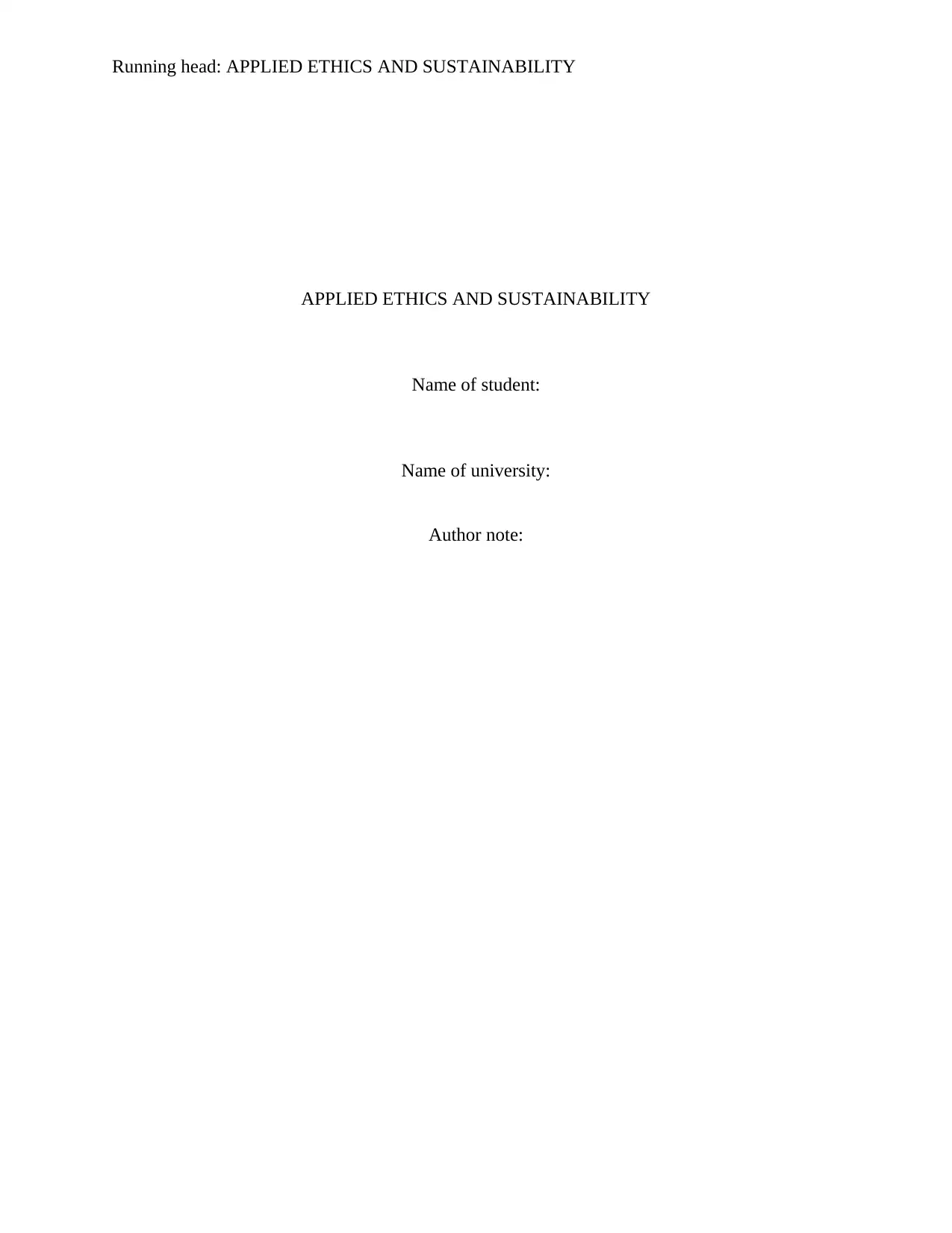
Running head: APPLIED ETHICS AND SUSTAINABILITY
APPLIED ETHICS AND SUSTAINABILITY
Name of student:
Name of university:
Author note:
APPLIED ETHICS AND SUSTAINABILITY
Name of student:
Name of university:
Author note:
Paraphrase This Document
Need a fresh take? Get an instant paraphrase of this document with our AI Paraphraser
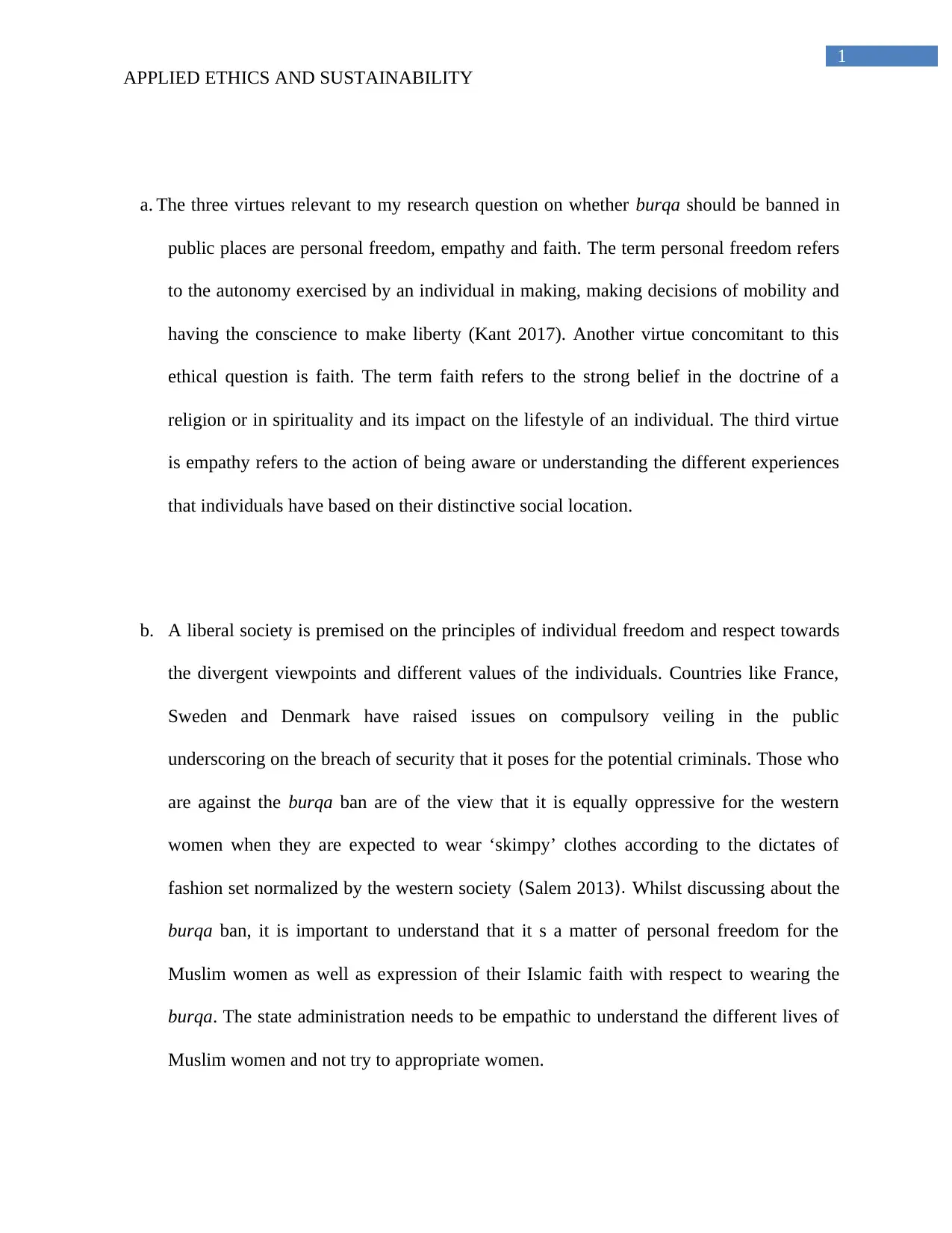
1
APPLIED ETHICS AND SUSTAINABILITY
a. The three virtues relevant to my research question on whether burqa should be banned in
public places are personal freedom, empathy and faith. The term personal freedom refers
to the autonomy exercised by an individual in making, making decisions of mobility and
having the conscience to make liberty (Kant 2017). Another virtue concomitant to this
ethical question is faith. The term faith refers to the strong belief in the doctrine of a
religion or in spirituality and its impact on the lifestyle of an individual. The third virtue
is empathy refers to the action of being aware or understanding the different experiences
that individuals have based on their distinctive social location.
b. A liberal society is premised on the principles of individual freedom and respect towards
the divergent viewpoints and different values of the individuals. Countries like France,
Sweden and Denmark have raised issues on compulsory veiling in the public
underscoring on the breach of security that it poses for the potential criminals. Those who
are against the burqa ban are of the view that it is equally oppressive for the western
women when they are expected to wear ‘skimpy’ clothes according to the dictates of
fashion set normalized by the western society (Salem 2013). Whilst discussing about the
burqa ban, it is important to understand that it s a matter of personal freedom for the
Muslim women as well as expression of their Islamic faith with respect to wearing the
burqa. The state administration needs to be empathic to understand the different lives of
Muslim women and not try to appropriate women.
APPLIED ETHICS AND SUSTAINABILITY
a. The three virtues relevant to my research question on whether burqa should be banned in
public places are personal freedom, empathy and faith. The term personal freedom refers
to the autonomy exercised by an individual in making, making decisions of mobility and
having the conscience to make liberty (Kant 2017). Another virtue concomitant to this
ethical question is faith. The term faith refers to the strong belief in the doctrine of a
religion or in spirituality and its impact on the lifestyle of an individual. The third virtue
is empathy refers to the action of being aware or understanding the different experiences
that individuals have based on their distinctive social location.
b. A liberal society is premised on the principles of individual freedom and respect towards
the divergent viewpoints and different values of the individuals. Countries like France,
Sweden and Denmark have raised issues on compulsory veiling in the public
underscoring on the breach of security that it poses for the potential criminals. Those who
are against the burqa ban are of the view that it is equally oppressive for the western
women when they are expected to wear ‘skimpy’ clothes according to the dictates of
fashion set normalized by the western society (Salem 2013). Whilst discussing about the
burqa ban, it is important to understand that it s a matter of personal freedom for the
Muslim women as well as expression of their Islamic faith with respect to wearing the
burqa. The state administration needs to be empathic to understand the different lives of
Muslim women and not try to appropriate women.
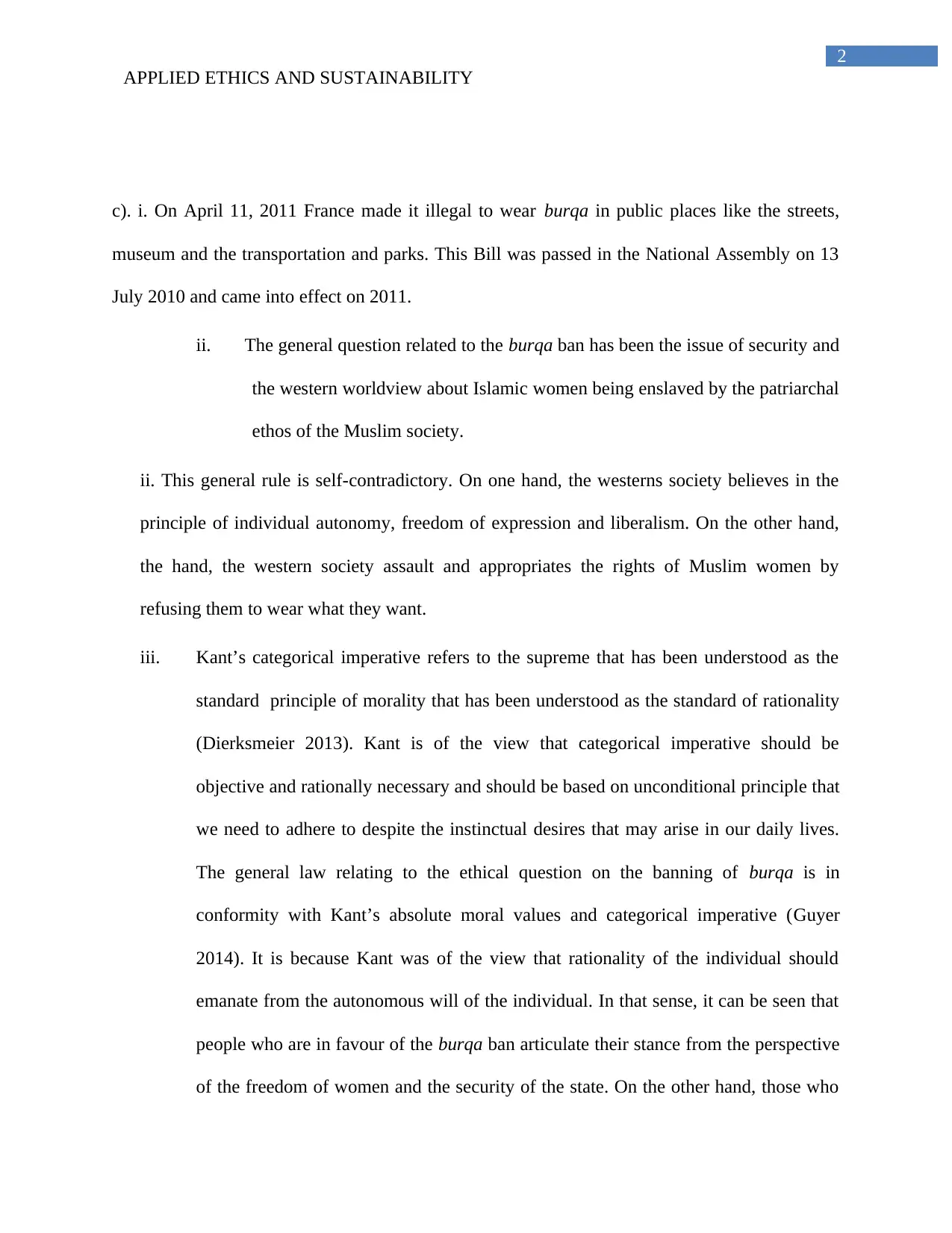
2
APPLIED ETHICS AND SUSTAINABILITY
c). i. On April 11, 2011 France made it illegal to wear burqa in public places like the streets,
museum and the transportation and parks. This Bill was passed in the National Assembly on 13
July 2010 and came into effect on 2011.
ii. The general question related to the burqa ban has been the issue of security and
the western worldview about Islamic women being enslaved by the patriarchal
ethos of the Muslim society.
ii. This general rule is self-contradictory. On one hand, the westerns society believes in the
principle of individual autonomy, freedom of expression and liberalism. On the other hand,
the hand, the western society assault and appropriates the rights of Muslim women by
refusing them to wear what they want.
iii. Kant’s categorical imperative refers to the supreme that has been understood as the
standard principle of morality that has been understood as the standard of rationality
(Dierksmeier 2013). Kant is of the view that categorical imperative should be
objective and rationally necessary and should be based on unconditional principle that
we need to adhere to despite the instinctual desires that may arise in our daily lives.
The general law relating to the ethical question on the banning of burqa is in
conformity with Kant’s absolute moral values and categorical imperative (Guyer
2014). It is because Kant was of the view that rationality of the individual should
emanate from the autonomous will of the individual. In that sense, it can be seen that
people who are in favour of the burqa ban articulate their stance from the perspective
of the freedom of women and the security of the state. On the other hand, those who
APPLIED ETHICS AND SUSTAINABILITY
c). i. On April 11, 2011 France made it illegal to wear burqa in public places like the streets,
museum and the transportation and parks. This Bill was passed in the National Assembly on 13
July 2010 and came into effect on 2011.
ii. The general question related to the burqa ban has been the issue of security and
the western worldview about Islamic women being enslaved by the patriarchal
ethos of the Muslim society.
ii. This general rule is self-contradictory. On one hand, the westerns society believes in the
principle of individual autonomy, freedom of expression and liberalism. On the other hand,
the hand, the western society assault and appropriates the rights of Muslim women by
refusing them to wear what they want.
iii. Kant’s categorical imperative refers to the supreme that has been understood as the
standard principle of morality that has been understood as the standard of rationality
(Dierksmeier 2013). Kant is of the view that categorical imperative should be
objective and rationally necessary and should be based on unconditional principle that
we need to adhere to despite the instinctual desires that may arise in our daily lives.
The general law relating to the ethical question on the banning of burqa is in
conformity with Kant’s absolute moral values and categorical imperative (Guyer
2014). It is because Kant was of the view that rationality of the individual should
emanate from the autonomous will of the individual. In that sense, it can be seen that
people who are in favour of the burqa ban articulate their stance from the perspective
of the freedom of women and the security of the state. On the other hand, those who
⊘ This is a preview!⊘
Do you want full access?
Subscribe today to unlock all pages.

Trusted by 1+ million students worldwide
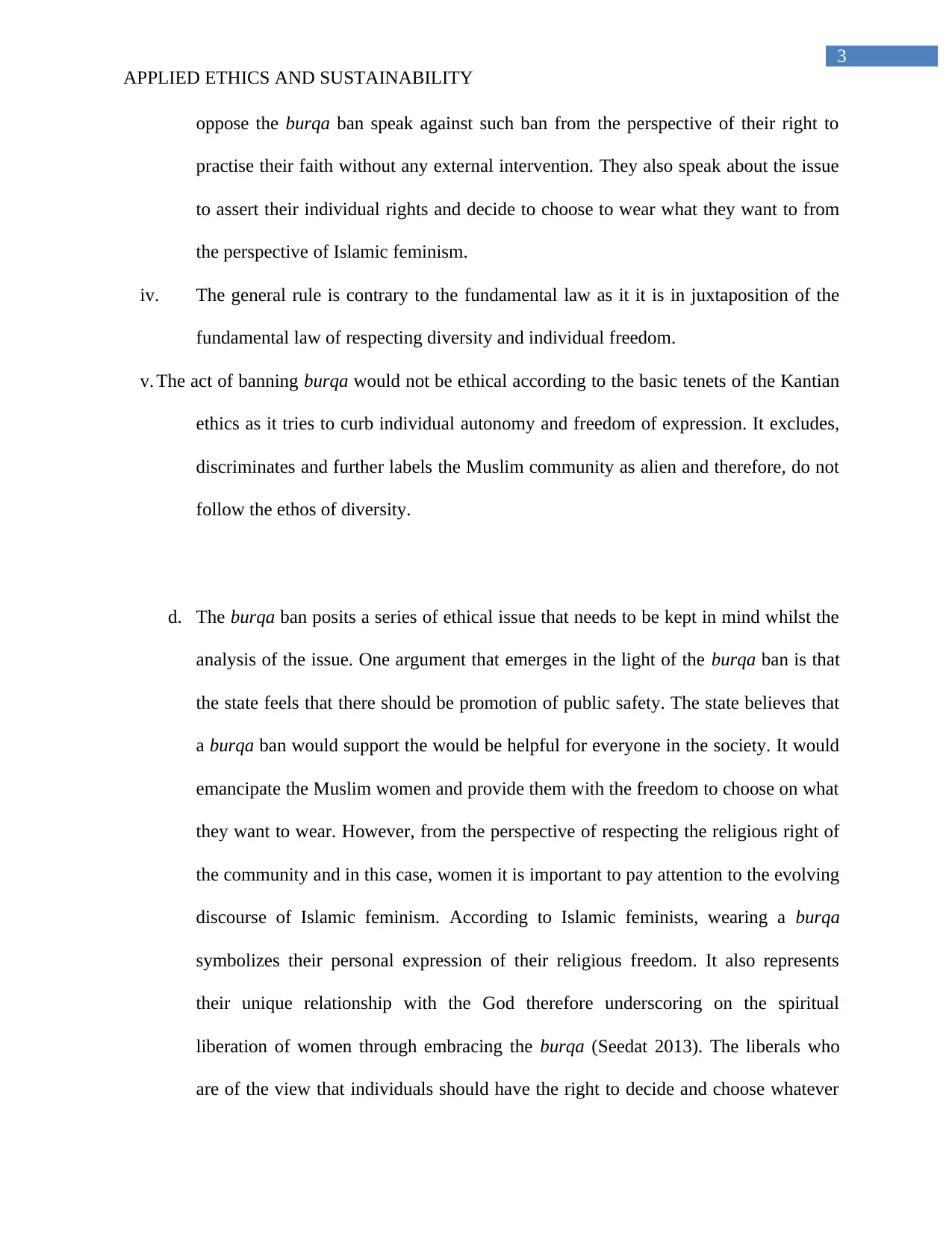
3
APPLIED ETHICS AND SUSTAINABILITY
oppose the burqa ban speak against such ban from the perspective of their right to
practise their faith without any external intervention. They also speak about the issue
to assert their individual rights and decide to choose to wear what they want to from
the perspective of Islamic feminism.
iv. The general rule is contrary to the fundamental law as it it is in juxtaposition of the
fundamental law of respecting diversity and individual freedom.
v. The act of banning burqa would not be ethical according to the basic tenets of the Kantian
ethics as it tries to curb individual autonomy and freedom of expression. It excludes,
discriminates and further labels the Muslim community as alien and therefore, do not
follow the ethos of diversity.
d. The burqa ban posits a series of ethical issue that needs to be kept in mind whilst the
analysis of the issue. One argument that emerges in the light of the burqa ban is that
the state feels that there should be promotion of public safety. The state believes that
a burqa ban would support the would be helpful for everyone in the society. It would
emancipate the Muslim women and provide them with the freedom to choose on what
they want to wear. However, from the perspective of respecting the religious right of
the community and in this case, women it is important to pay attention to the evolving
discourse of Islamic feminism. According to Islamic feminists, wearing a burqa
symbolizes their personal expression of their religious freedom. It also represents
their unique relationship with the God therefore underscoring on the spiritual
liberation of women through embracing the burqa (Seedat 2013). The liberals who
are of the view that individuals should have the right to decide and choose whatever
APPLIED ETHICS AND SUSTAINABILITY
oppose the burqa ban speak against such ban from the perspective of their right to
practise their faith without any external intervention. They also speak about the issue
to assert their individual rights and decide to choose to wear what they want to from
the perspective of Islamic feminism.
iv. The general rule is contrary to the fundamental law as it it is in juxtaposition of the
fundamental law of respecting diversity and individual freedom.
v. The act of banning burqa would not be ethical according to the basic tenets of the Kantian
ethics as it tries to curb individual autonomy and freedom of expression. It excludes,
discriminates and further labels the Muslim community as alien and therefore, do not
follow the ethos of diversity.
d. The burqa ban posits a series of ethical issue that needs to be kept in mind whilst the
analysis of the issue. One argument that emerges in the light of the burqa ban is that
the state feels that there should be promotion of public safety. The state believes that
a burqa ban would support the would be helpful for everyone in the society. It would
emancipate the Muslim women and provide them with the freedom to choose on what
they want to wear. However, from the perspective of respecting the religious right of
the community and in this case, women it is important to pay attention to the evolving
discourse of Islamic feminism. According to Islamic feminists, wearing a burqa
symbolizes their personal expression of their religious freedom. It also represents
their unique relationship with the God therefore underscoring on the spiritual
liberation of women through embracing the burqa (Seedat 2013). The liberals who
are of the view that individuals should have the right to decide and choose whatever
Paraphrase This Document
Need a fresh take? Get an instant paraphrase of this document with our AI Paraphraser
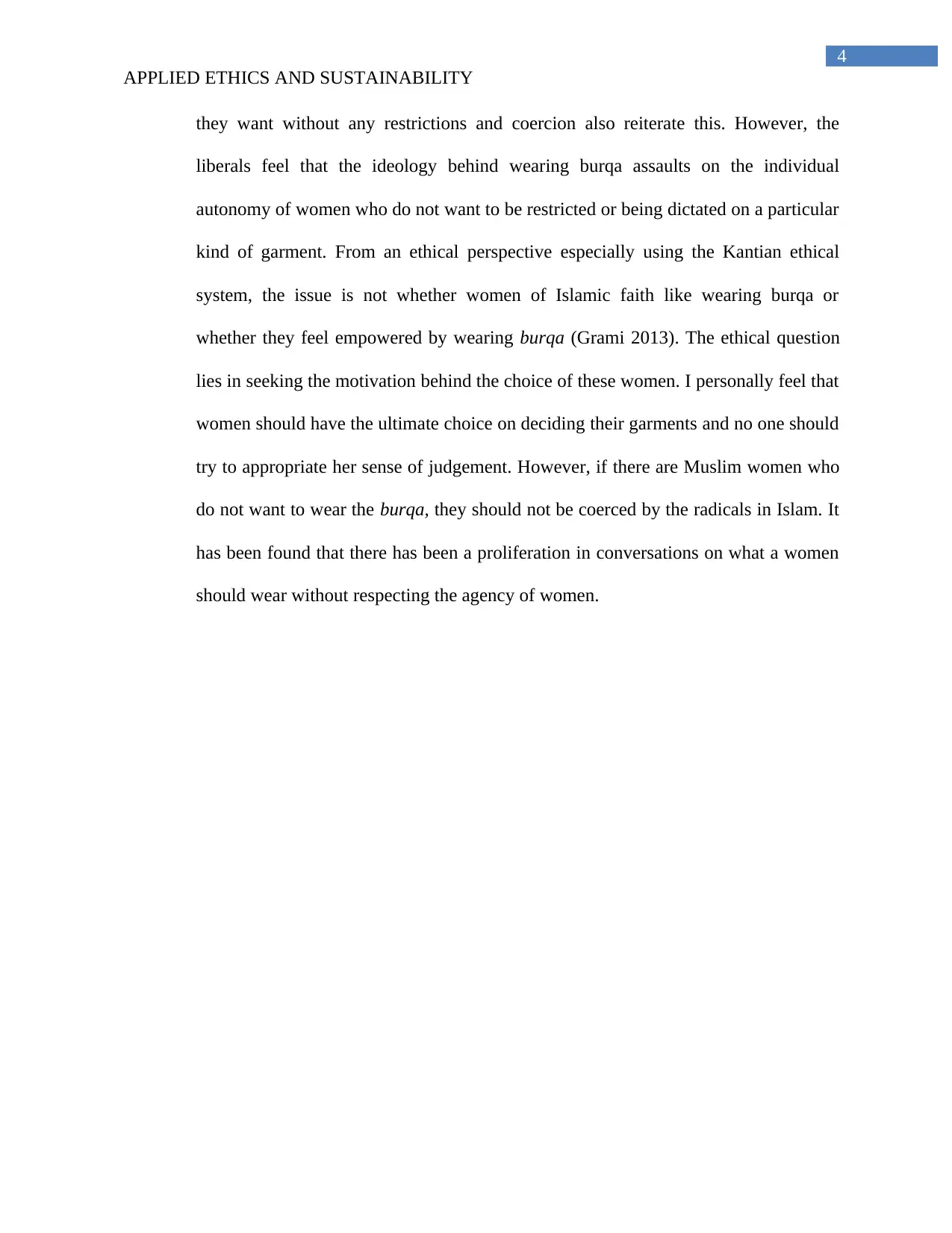
4
APPLIED ETHICS AND SUSTAINABILITY
they want without any restrictions and coercion also reiterate this. However, the
liberals feel that the ideology behind wearing burqa assaults on the individual
autonomy of women who do not want to be restricted or being dictated on a particular
kind of garment. From an ethical perspective especially using the Kantian ethical
system, the issue is not whether women of Islamic faith like wearing burqa or
whether they feel empowered by wearing burqa (Grami 2013). The ethical question
lies in seeking the motivation behind the choice of these women. I personally feel that
women should have the ultimate choice on deciding their garments and no one should
try to appropriate her sense of judgement. However, if there are Muslim women who
do not want to wear the burqa, they should not be coerced by the radicals in Islam. It
has been found that there has been a proliferation in conversations on what a women
should wear without respecting the agency of women.
APPLIED ETHICS AND SUSTAINABILITY
they want without any restrictions and coercion also reiterate this. However, the
liberals feel that the ideology behind wearing burqa assaults on the individual
autonomy of women who do not want to be restricted or being dictated on a particular
kind of garment. From an ethical perspective especially using the Kantian ethical
system, the issue is not whether women of Islamic faith like wearing burqa or
whether they feel empowered by wearing burqa (Grami 2013). The ethical question
lies in seeking the motivation behind the choice of these women. I personally feel that
women should have the ultimate choice on deciding their garments and no one should
try to appropriate her sense of judgement. However, if there are Muslim women who
do not want to wear the burqa, they should not be coerced by the radicals in Islam. It
has been found that there has been a proliferation in conversations on what a women
should wear without respecting the agency of women.
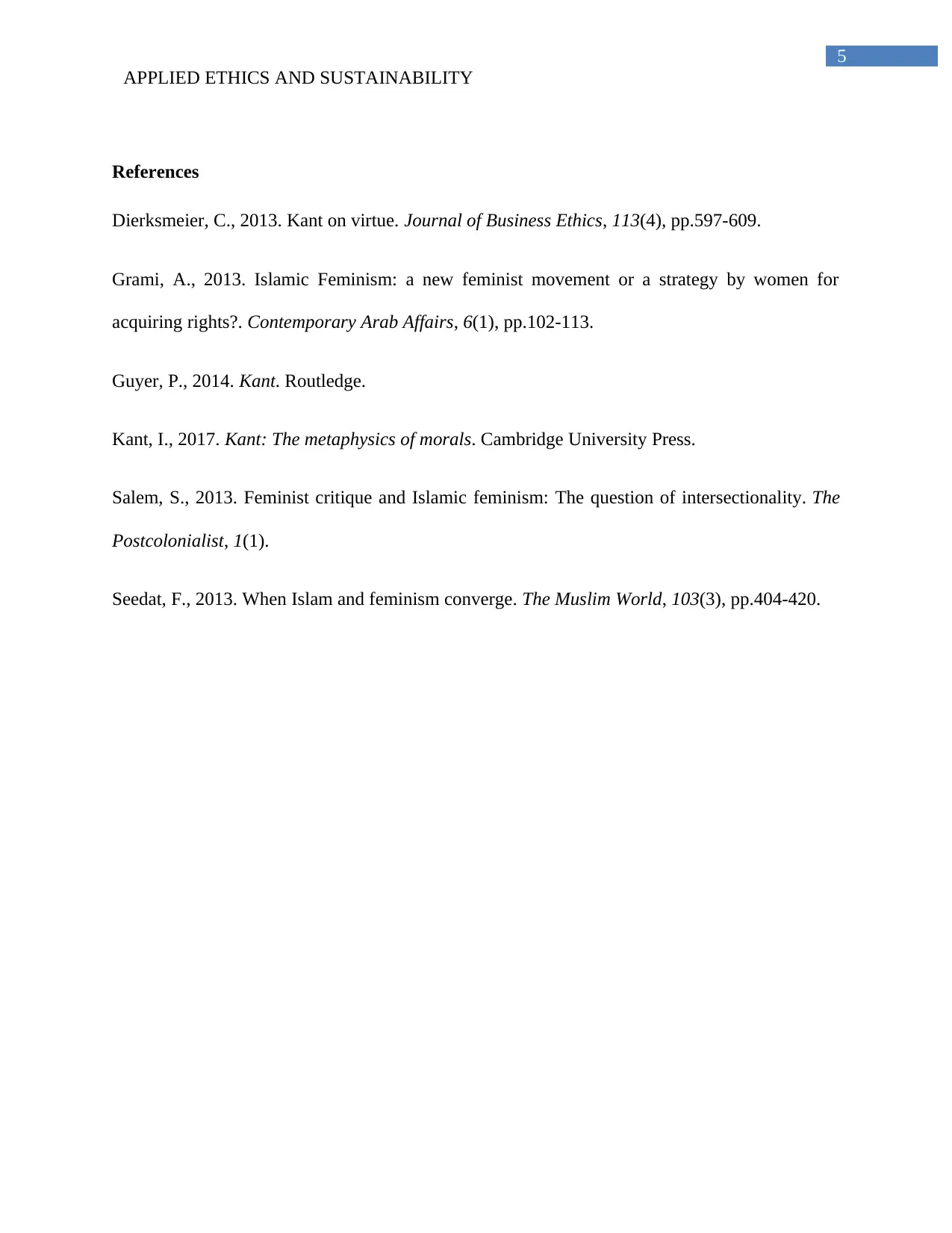
5
APPLIED ETHICS AND SUSTAINABILITY
References
Dierksmeier, C., 2013. Kant on virtue. Journal of Business Ethics, 113(4), pp.597-609.
Grami, A., 2013. Islamic Feminism: a new feminist movement or a strategy by women for
acquiring rights?. Contemporary Arab Affairs, 6(1), pp.102-113.
Guyer, P., 2014. Kant. Routledge.
Kant, I., 2017. Kant: The metaphysics of morals. Cambridge University Press.
Salem, S., 2013. Feminist critique and Islamic feminism: The question of intersectionality. The
Postcolonialist, 1(1).
Seedat, F., 2013. When Islam and feminism converge. The Muslim World, 103(3), pp.404-420.
APPLIED ETHICS AND SUSTAINABILITY
References
Dierksmeier, C., 2013. Kant on virtue. Journal of Business Ethics, 113(4), pp.597-609.
Grami, A., 2013. Islamic Feminism: a new feminist movement or a strategy by women for
acquiring rights?. Contemporary Arab Affairs, 6(1), pp.102-113.
Guyer, P., 2014. Kant. Routledge.
Kant, I., 2017. Kant: The metaphysics of morals. Cambridge University Press.
Salem, S., 2013. Feminist critique and Islamic feminism: The question of intersectionality. The
Postcolonialist, 1(1).
Seedat, F., 2013. When Islam and feminism converge. The Muslim World, 103(3), pp.404-420.
⊘ This is a preview!⊘
Do you want full access?
Subscribe today to unlock all pages.

Trusted by 1+ million students worldwide
1 out of 6
Your All-in-One AI-Powered Toolkit for Academic Success.
+13062052269
info@desklib.com
Available 24*7 on WhatsApp / Email
![[object Object]](/_next/static/media/star-bottom.7253800d.svg)
Unlock your academic potential
Copyright © 2020–2025 A2Z Services. All Rights Reserved. Developed and managed by ZUCOL.